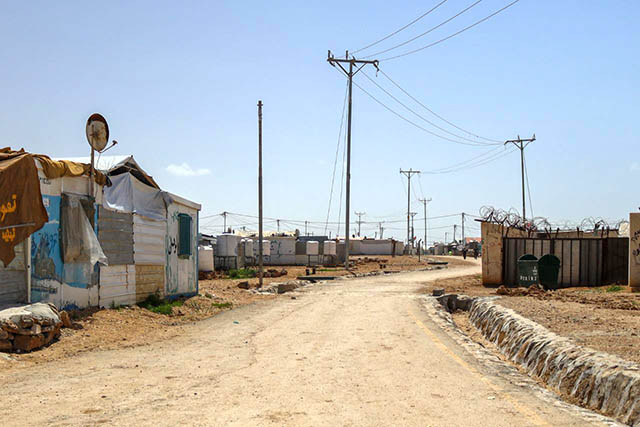AMMAN — As streets, neighbourhoods and public places across Jordan lie virtually empty as a result of the Kingdom’s tight restrictions on movement in a bid to fight COVID-19, Zaatari refugee camp, the world’s largest camp for Syrian refugees located near Mafraq, has also gone quiet.
“[The camp] is super quiet now,” said Moh’d Al Taher, an associate external relations officer for the UNHCR and one of a few agency staff members currently living and working in Zaatari amid Jordan’s nationwide curfew.
“Before, it was very active — people going to the markets, the streets,” he told The Jordan Times during a recent phone interview. “There is [usually] a social life. We have community centres, we have football activities, sports activities… now, there is silence, which is good, because we want to encourage people to stay at home.”
According to Taher, everything happening outside of the camp, from the rigid curfew regulations imposed nationwide to the minute specifications on opening and closing times of markets and other businesses, is being reflected within.
Residents of Zaatari are being told to stay inside and to leave their homes only to buy food and other needed supplies, while all non-essential businesses and institutions have shut down.
“We want to prevent any social gathering or activity, and because of that all community centres are closed and schools are closed, following the decision of the Ministry of Education,” Taher said.
Just like their peers across the country, students in the camp are keeping up with their studies via televised lessons and the Education Ministry’s e-learning platform “Darsak”.
Taher noted that the recent shift to e-learning has lead the agency and authorities in the camp to extend the hours of electricity supply to people’s homes from 8:30am to 6pm and from 8pm to 10pm, adding that the agency keeps residents updated regularly on lesson schedules, updates on the curfew and information about COVID-19 through text messages, social media platforms and community mobilisers who spread messages throughout the camp via word-of-mouth.
Much as movement between governorates throughout the Kingdom has been cut off entirely, Zaatari’s connection with the rest of the country has also been severed in an attempt to keep the virus from entering the camp, he said.
“We took all measures to keep the camp away from COVID-19,” Taher said.
He pointed as an example to the “leave permits” and work permits, which before the curfew allowed refugees to either work or visit family and friends outside depending on the nature of the permit, but have now been suspended. Those living outside Zaatari are also not allowed to enter the camp, except for essential agency and government personnel.
“Because of these measures [the curfew], we ensure that people are staying here inside the camp, without mixing or gathering with people outside the camp,” he said, adding that as of yet, there have been “no instances of people breaking curfew regulations”.
So far, the measures seem to be working. The camp has no confirmed or even suspected cases of the virus, according to both Taher and Musuaab Abu Khaite, a general practitioner and medical supervisor at the Syrian American Medical Society’s (SAMS) centre in the camp.
Medical facilities, however, are still operating and have intensified preparations following instructions from the Ministry of Health and the UNHCR, Abu Khaite said in a statement to The Jordan Times on Monday, noting that non-coronavirus-related visits to the SAMS medical centre have been reduced to emergencies only.
The ministry, the UNHCR and security services communicate with all medical centres in Zaatari on a day-to-day basis regarding whether anyone showing COVID-19 symptoms has visited the centres, the doctor said.
In the case that an individual in the camp is suspected to be infected, testing for the virus will take place outside the camp at a public hospital in the nearby city of Mafraq. The same applies to isolation of suspected and confirmed cases, Taher said, noting that “there will be no medical isolation or quarantine inside the camp”.
“In the end, it’s a camp. It’s a crowded area, and there is no possibility of having an isolation area inside the camp because it is dangerous,” he noted.
While Taher expressed that he is thankful that Zaatari has so far been spared the large outbreaks overtaking other densely populated areas around the world, both he and Abu Khaite nonetheless warned that a COVID-19 outbreak in the camp is a “real threat”.
“There is definitely a fear of a case appearing in Zaatari based on the conditions inside the camp, which include overpopulation and tents being in close proximity to each other. This is a cause for concern,” Abu Khaite said.
“Our worry now is whether there are any cases within the camp... and keeping refugees away from this issue,” Taher said, adding that “the biggest challenge now is time. We are waiting for this period to pass to return to normal life”.
This “normal life” seems a long way off, however, as additional concerns over the economic impact of the government’s measures to distance Zaatari from the rest of the Kingdom and people within the camp from each other grow.According to Taher, the economic effects of COVID-19 on people’s livelihoods and financial stability are “already manifesting themselves” within the camp.
“In the camp, we have 1,200 informal businesses and all of them are closed. And many have permits to leave the camp for work, but all of these have been suspended,” he said, stressing that this “will definitely affect refugees’ economic life”.
